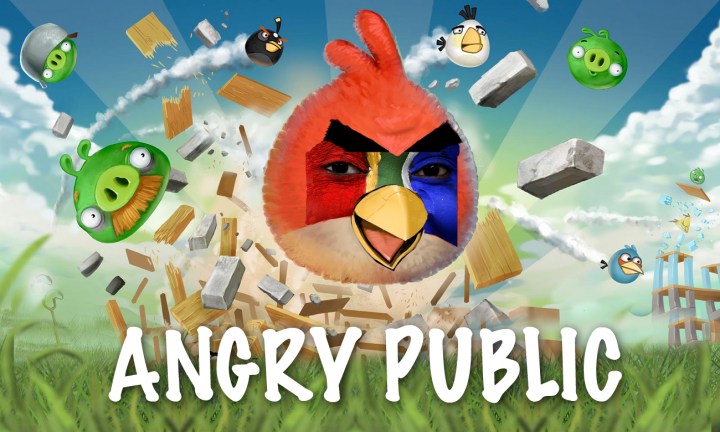Politics, South Africa
Analysis: SA’s latest game – Angry Public

Poor President Jacob Zuma. His presidency has been defined by mishap after mishap. Some of the mistakes he inherited; big chunks of problems he brought upon himself. But just when it felt like he finally had the situation under control, something new happened: massive push-back from the public. By SIPHO HLONGWANE.
The president’s administration has been forced to make an about-face on two major decisions of late: the e-tolling saga and Richard Mdluli. And, to a lesser extent, the Protection of State Information Bill.
Nazir Alli, the CEO of the South African National Roads Agency suddenly handed in his resignation after the implementation of the Gauteng Freeway Improvement Project, otherwise known as e-tolling, was blocked by the courts. The ruling came just moments after the ANC and Cosatu had agreed to postpone implementing the project for a few weeks to see if there weren’t alternative funding models available.
Secondly, the highly controversial head of crime intelligence, Richard Mdluli, has been shifted sideways within the South African Police Service.
In both instances, it took enormous public pressure to make Zuma shift positions.
This comes in the wake of civil opposition to the information bill, which resulted in it being batted back and forth between Parliament and Luthuli House, with important concessions being made by the drafters of the bill.
The discontent is everywhere. The streets of the poorer parts of South Africa are constantly on fire thanks to service delivery riots. Now the unhappiness is spreading to the suburbs, where the preferred method of protest is not the Molotov cocktail, but a much more effective tool: a court application.
As you read this, another big fight looms – residents of certain suburbs in Johannesburg are furious over the extension of the city’s roadside parking system.
Faith in the government’s ability to deliver has eroded. South Africans are furious about having to pay more taxes and levies. The anger arises because the feeling is that government is failing to consult with the public and get buy-in during the project-planning phase.
Also, there is a sense that the extra tax won’t translate into better public service, but rather flashier cars for public servants.
There’s one underlying cause: the South African state is becoming increasingly dysfunctional. According to auditor-general Terrence Nombembe, things are getting to a level where turning back will be impossible.
He warned that “a lack of skills and competence at local government level; impunity for those who fail to deliver, which demoralises those who try; and the failure of those in charge to account for their mistakes” has now brought the country to the point where the situation is dire.
“The accountability for the results is not taken as seriously as it should be. Bad results are regarded as a norm and when people get a disclaimer or qualified reports, little happens to them to show that this is unacceptable. This is the culture we need to be concerned about,” Nombembe said.
He said the biggest concern was that his watchdog role in government was being made redundant because the government simply refuses to pay him any attention. Nobody represents this culture of impunity more than Richard Mdluli.
This isn’t the first time a president has refused to cast out a bent cop. Jackie Selebi enjoyed the protection of Thabo Mbeki for a long time – to the extent that the National Prosecuting Authority was hobbled in its investigations into the former commissioner’s mob ties.
Yet this time around, the outrage from the public is palpable. To ease the pressure, Mdluli has been shifted sideways within the SAPS.
“The medicine that is really needed is the removal of Mdluli from his post and credible efforts to insulate the investigation into him – and indeed the operations of the police and National Prosecuting Authority more broadly – from political interference,” the M&G said.
“If that does not happen, the anger within the security services, the prosecuting authority, the ANC and civil society may engulf President Zuma in a way that a few bent cops simply cannot control.”
Doing just enough to hold off the baying hounds is a lesson that Zuma would have learnt with the information bill. After months of relentless pressure from civil society, a watered-down version of the original bill was passed in the National Assembly. It currently sits before the National Council of Provinces.
Then of course, there is the e-tolling scandal. The rejection of the scheme by the public was loud and hopping with fury. The unions mobilised against the project, as did other civil society groups. The message to government was loud and clear: you are committing robbery by another name. With no other tax-funded alternative for transport around Gauteng, the government taxed the public for using public roads.
The government eventually decided to back down, but not before an e-tolling opposition alliance managed to get the courts to force a halt on the entire thing. Heads have already started rolling – the first is that of the politically expedient Sanral CEO, Nazir Alli.
There the gantries sit, an expensive testament to the government’s utter failure to get public buy-in. Have we finally reached the point where the public’s cynicism has bubbled over? Is all trust eroded? Is this a point of no return?
Not quite, according to political analyst Eusebius McKaiser of the Wits Centre of Ethics. “I don’t think that we can conclude in absolute terms that there is no trust in the government,” he said. “Rather, I think that this is a reflection of the fact that South Africans are very angry about the fact that they were not adequately consulted with in the public participation phase of the project, as is required by law and just the practice of good governance. This anger cuts across racial and class lines.”
McKaiser continued: “My hope is that the government will learn from this so that… next time they will take public participation very seriously.”
Ensuring that the public is suitably informed and consulted often means that new levies are accepted. The city of Cape Town, for example, has had a roadside parking billing system that Johannesburg is trying to implement. This system works without the public’s umbrage because proper consultation was undertaken and the reasons for this new charge were explained properly. And there is no suspicion that the money is siphoned into the pockets of well-connected cronies.
But to fix the underlying reason for the public’s lack of trust is going to take a lot more than robust consultation. We are going to have to be snatched back from the beginnings of a failed state.
So Zuma has a new problem on his hands. It’s one he cannot solve with behind-the-scenes scheming. This time, he has to deliver. DM
Read more:
- Paranoid have taken over the asylum in Mail & Guardian.
- That sinking feeling: Khoza 2.0 unleashes a wave of silence in Daily Maverick.







 Become an Insider
Become an Insider